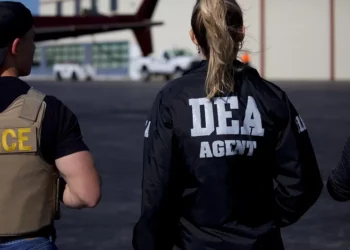
Executive of $50 Million Mail Fraud Scheme Sentenced To Federal Prison
Executive of $50 Million Mail Fraud Scheme Sentenced To Federal Prison
The U.S. Attorneys Office of The District of Maryland announced that Chief U.S. District Judge James K. Bredar sentenced Eric Epstein, age 58, of Pompano Beach, Florida (previously of Owings Mills, Maryland) today to 135 months in prison for conspiracy to commit mail fraud and conspiracy to defraud the Internal Revenue Service, and sentenced co-conspirator Andrew Stafford, age 58, of Bel Air, Maryland, to six years in prison for conspiracy to commit mail fraud, each followed by three years of supervised release. Epstein, Stafford, and their co-conspirators admitted perpetrating a nationwide fraudulent telemarketing scheme designed to ship unwanted and vastly over-priced light bulbs and cleaning supplies to thousands of businesses and non-profit organizations. Epstein and Stafford were leaders in the scheme in which they and their co-conspirators obtained more than $50 million.
The sentence was announced by United States Attorney for the District of Maryland Robert K. Hur; Special Agent in Charge Gordon B. Johnson of the Federal Bureau of Investigation, Baltimore Field Office; Acting Special Agent in Charge Kelly R. Jackson of the Internal Revenue Service, Criminal Division; and Inspector in Charge Eric Shen of the United States Postal Inspection Service, Washington Division.
“Eric Epstein and his co-conspirators preyed on churches, schools, homeless shelters, and businesses to steal more than $50 million through a sophisticated scheme that involved sham sales of light bulbs and cleaning supplies,” said U.S. Attorney Robert K. Hur. “Not only did he not pay taxes on much of the money, but Epstein used the ill-gotten gains to fund a lavish lifestyle including luxury vehicles, a million-dollar home, and extravagant jewelry. Federal agents and prosecutors will pursue perpetrators of such fraud schemes to recover money stolen from the victims and from the United States Treasury.”
“Eric Epstein’s conspiracy was a scheme motivated by pure greed. Through false and fraudulent business practices, Epstein not only personally enriched himself, but cheated several businesses out of more than $50 million in the process, ” said Kelly R. Jackson, Acting Special Agent in Charge of the Internal Revenue Service-Criminal Investigation, Washington, D.C. Field Office. “IRS Criminal Investigation, in partnership with our law enforcement partners, will continue to investigate corporate fraud and hold corporations and their executives accountable when failing to comply with the law.”
According to Epstein’s and Stafford’s plea agreements and other court documents, in 2003, Epstein co-founded a Maryland-based telemarketing business, Midway Industries, LLC and Johnson Distributing, LLC and incorporated them in Maryland, each with the stated purpose to engage in the retail sale of light bulbs and cleaning supplies, among other activities. Between July 22, 2008 and April 18, 2014, Epstein and Brian Wallen incorporated additional shell entities, in Maryland and Florida. Midway, Johnson Distributing, and the shell entities will be collectively referred to here as “Midway.”
Epstein, Stafford, and other co-conspirators obtained tens of millions of dollars from thousands of victim businesses by deceiving the businesses into paying exorbitant prices for light bulbs and cleaning supplies, as well as paying for products that the businesses never ordered. Victims of the scam included global conglomerates, small family-run businesses, government agencies, churches, schools, homeless shelters, and other non-profits.
In 2012, Epstein sold a majority financial interest in Midway to Brian Wallen for $15 million, but he retained an ownership stake, received a regular paycheck, and continued to advise and supervise Midway employees, along with Brian Wallen and Andrew Stafford.
Specifically, from 2003 through 2014, Midway employees would cold-call businesses making false representations, including that the business had an existing business relationship with Midway. During these cold-calls, the conspirators sought to obtain the personal information of an “authorized representative” for the business, which the Midway collections department could use later to justify an order. The conspirators concealed Midway’s true locations in Reisterstown, Maryland and in Florida, as well as the price of the products and the quantity of any shipment. Often the conspirators would tell the victim businesses that Midway would send a “half box” of light bulbs. In fact, the “half box” was a deceptive technique used to understate the volume and price of shipments, and disguise unwanted future shipments. As long as the victims continued paying the Midway invoices, in subsequent calls Epstein, Wallen, Stafford, and the conspirators misrepresented that the balance of the victim’s order, or their “regular seasonal order” had recently been shipped, despite no order having been made by the victim business, and no actual shipment having yet been sent.
When the authorized representative at a business could not be reached, Epstein, Wallen, Stafford, and the conspirators would simply send the product and an inflated invoice to the victim, without the victim placing an order. The conspirators referred to this practice as “just ship.” If the authorized representative had quit, been fired, or even passed away, the conspirators sent a product and inflated invoice to the victim business knowing that the victim would be unable to dispute the validity of the order. This practice was referred to by the Midway conspirators as a “down the road.” The Midway conspirators regularly sought the approval of Epstein, Wallen and Stafford, as their supervisors, to engage in the practices of “just ship,” or “down the road.”
Epstein, Wallen, Stafford, and the conspirators ordered the light bulbs and cleaning supplies from a company located in New Jersey (supplier). They instructed the supplier to ship the products to the victim without an invoice, and to send the invoices directly to Midway. Epstein, Wallen, Stafford, and the conspirators then sent inflated invoices to the billing departments of the victims, that were regularly 900% greater than the prices Midway paid for the supplies, and sometimes greater than 8,000% above the supplier’s prices. When victims did not remit payment, the collections department at Midway repeatedly called the victims in order to force them to pay the inflated invoices. If the victim threatened to contact law enforcement or the Better Business Bureau, Epstein, Wallen, Stafford and the conspirators offered to revise the invoice to a discounted rate, or take back a product for either a “re-stocking fee” or “at cost,” which was still substantially greater than the cost of the products purchased from the supplier.
As a result of the fraud scheme, Midway sent fraudulent invoices to victim companies for more than $100 million and received more than $50 million in payments on those invoices.
Further, Epstein admitted that he caused victims’ checks payable to Midway corporate entities to be cashed at money remitters, while Epstein personally kept and used the money. Epstein and others at Midway also used Midway credit cards for lavish personal expenditures, such as luxury furniture and vehicles.
Co-conspirators Robert Chesser, age 46, of Dundalk, Maryland; Brandon Johnston, age 38, of Catonsville, Maryland; Alan Landsman, age 36, of York, Pennsylvania; Steven Phillips, age 64, of Pikesville, Maryland; Brandon Riggs, age 34, of Baltimore; and Thomas Wishon, age 54, of Cockeysville, Maryland, previously pleaded guilty to conspiracy to commit mail fraud in connection with their roles in the scheme, and were sentenced to between 30 months and 72 months in prison.
Charges against Brian Wallen were dismissed after his death.
United States Attorney Robert K. Hur thanked the FBI, the IRS, and the U.S. Postal Inspection Service for their work on the investigation. Mr. Hur commended Assistant U.S. Attorneys Sean R. Delaney and Harry M. Gruber, who prosecuted the case.
Recent Posts
Categories
- Attorney Marketing (4)
- Banking (5)
- Business Law (42)
- Child Custody (3)
- Court Cases (95)
- Criminal Defense (96)
- Discrimination (15)
- Divorce (1)
- Drug Crimes (4)
- DWI (1)
- Employment (24)
- Environmental (3)
- Family Law (1)
- Featured Articles (6)
- Identity Theft (1)
- Immigration (6)
- Latest News (123)
- Law Enforcement (8)
- Lawsuit (7)
- Medical (11)
- Personal Injury (3)
- Real Estate (1)
- Resources (88)
- Tax Law (13)
- Trademark (2)
- White Collar Crime (34)
RELATED ARTICLES

Attorney Review Guide (ARG) is a consumer-driven website focused on helping people in need of legal representation find the right attorney for their specific need. This means finding not only an attorney who practices in a specific field or geographical location, but one who is truly qualified and capable of handling your case effectively.
Company
About Attorney Review Guide
Support & Troubleshooting
Terms
Privacy Policy
Contact Us
Careers
Legal Marketing









